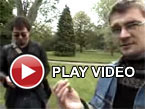Lea Bertucci, "Metal Aether"

My first exposure to this NYC-based alto saxophonist/composer’s work was last year's excellent All That is Solid Melts Into Air cassette, which featured some wonderfully snarling and churning double-bass drones. For her follow-up, Bertucci returns to NNA Tapes for a full-length LP sans string ensemble, focusing instead on her own solo performances. Naturally, her saxophone plays a large role, particularly in the fluttering and reverberant minimalism of the opening piece, but Bertucci also has a deep fondness for tapes and field recordings, resulting in an unusual and absorbing mélange of saxophone squalls, bloodcurdling squeals, simmering reveries of uncomfortably dissonant drones, and languorously dreamlike soundscapes.
Despite being one of the shorter pieces on the album, the opening "Patterns For Alto" is perhaps the most striking and effective distillation of Bertucci's distinctive artistry, marrying the trance-like repetition of early Terry Riley with Pauline Oliveros's groundbreaking work in harnessing the natural reverb of unusual architectural environments.More specifically, Bertucci unleashes a rapid-fire cascade of trilling saxophone patterns in a cavernous space, deftly using the enhanced reverb to weave an undulating web of squirming notes and ghostly overtones.It feels a lot like an eerily pretty swarm of lysergic bees.Curiously, Bertucci does not return to similar territory at all with the remaining three songs, but I suppose that makes sense given that her definitive statement in that vein only needed to be made once.The longer "Accumulations" is still saxophone-based, however, albeit in a completely different direction (or at least a completely different time scale). It deceptively opens as a slow, billowing fog of sinister harmonies, but that early dissonance quickly gives way to a languorous and lyrical saxophone melody.That motif too proves to be a bit of a feint, as the piece ultimately transforms into something in between those two poles: a murky and uncomfortably dissonant swirl of gauzy, layered harmonies mingled with viscerally harsh squeals that resemble the death throes of a free-jazz freak-out.It is quite a challenging piece, as it is not particularly easy on the ears, but it is also quite a fascinating and bracingly violent one that takes some unusual twists.The final moments are especially unexpected, resembling a sax and heavy electronic noise duo performing at a placid beach surrounded by birds.
Bertucci's sax does not play much of a recognizable role in the album's second half, aside from being the source of the early blurry and smeared drones in the epic "Sustain and Dissolve."While nerve-fraying dissonance continues to be the water in which Bertucci swims, "Sustain" is a bit more understated and nuanced than its predecessors, resembling a lovely drone piece that is constantly slipping out of focus to produce curdling and unnerving overtones.Unexpectedly, however, that motif eventually "dissolves" into a strange coda of hollow metallic pulses and distressed-sounding field recordings that evoke a deeply hallucinatory afternoon at the oceanside.Curiously, the brief closer "At Dawn" is almost a complete reprise of that coda, but re-envisioned as a lonelier and more warmly beautiful experience, transformed into a fond and bittersweet memory that mostly edits out the presence of all the other humans.It is actually my favorite piece on the album, which I feel a little guilty about, given that it lacks the sharp edges found elsewhere on Metal Aether: it is just simple, perfect, and nakedly lovely.
It is very hard not to love an album that contains four strong, compelling, and distinctive artistic statements in a row, so my only real caveat with Metal Aether is that the degree of dissonance can be "difficult" at times.It is crucial part of Bertucci's aesthetic, however, as the most consistent thread that runs throughout her work is a genius for subtly accumulating and resolving tension.One more item of note is that this album sometimes feels more like a compilation than a coherent, intentional whole, which I suppose it is, as it spans work across three years and two continents.I am the absolute last person who would attempt to stop someone from releasing a uniformly excellent album that does not quite fit together seamlessly, yet it bears mentioning that "Patterns For Alto" and "At Dawn" sound like the work of two completely different artists.As such, I would be very hard-pressed to succinctly describe Bertucci's overarching vision.However, she definitely has one, as Metal Aether never feels derivative or particularly indebted to other artists: inspiration may came from different places, yet the end results are always triumphantly Bertuccian.I will definitely want to hear whatever she records next, even if I have absolutely no idea quite what direction it may take.In any case, this is a great album.I suspect that the sustained and roiling sax eruption of "Patterns for Alto" will be the piece that gets all the initial attention, but anyone who takes a deeper plunge will likely find that there are plenty of other highlights that just take slightly longer to reveal themselves.
 



